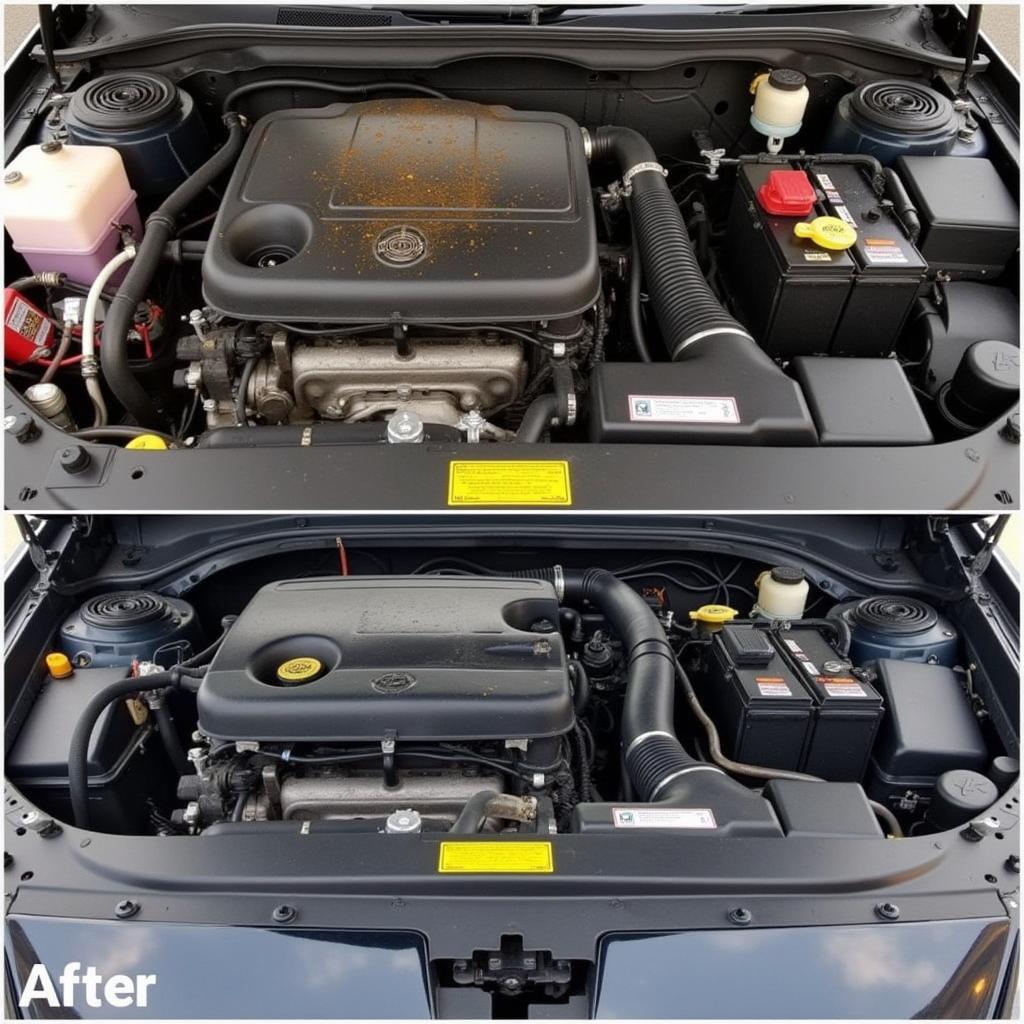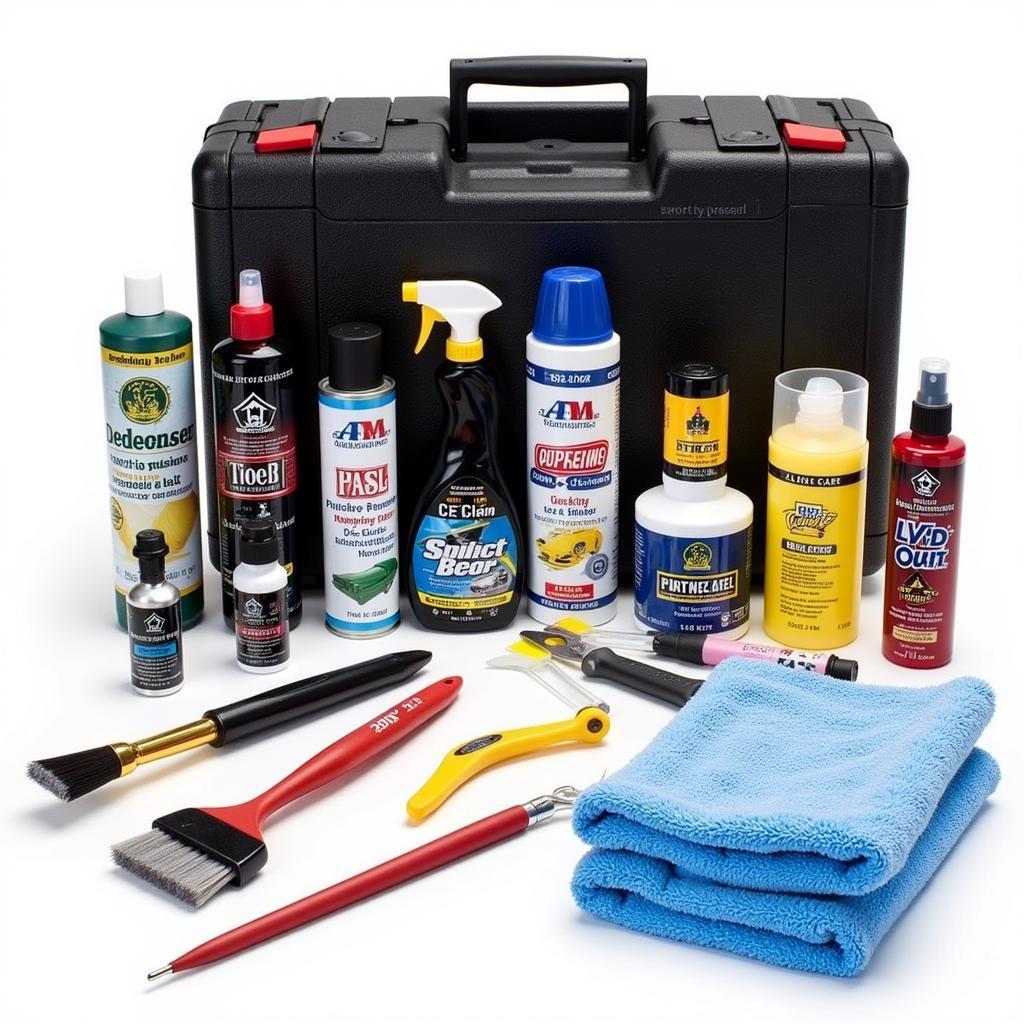Car Engine Detailing Tools are essential for maintaining the performance and appearance of your vehicle’s engine. Keeping your engine clean not only enhances its visual appeal but also contributes to its longevity and helps in identifying potential leaks or issues early on. Let’s delve into the world of engine detailing and explore the must-have tools for achieving professional-level results. Learn how to choose the right tools and techniques for your specific needs and keep your engine bay looking its best. You can schedule a car diagnostic check up with DiagFixPro for professional advice.
Essential Car Engine Detailing Tools: Your Arsenal for a Sparkling Engine Bay
A clean engine isn’t just about aesthetics; it’s about preserving the heart of your vehicle. Having the right car engine detailing tools makes all the difference. From degreasers and brushes to specialized cleaning solutions, understanding the purpose of each tool will empower you to achieve a showroom-worthy finish.
Degreasers: The Foundation of Engine Cleaning
Degreasers are the cornerstone of any engine cleaning process. Choosing the right degreaser depends on the level of grime and the sensitivity of your engine components. Opt for a biodegradable, non-toxic degreaser for routine cleaning and a stronger, more specialized formula for heavily soiled engines.
- All-Purpose Degreasers: Ideal for regular maintenance and light cleaning.
- Heavy-Duty Degreasers: Formulated to tackle tough grease and grime buildup.
- Citrus-Based Degreasers: A more environmentally friendly option for moderate cleaning.
Brushes: Reaching Every Nook and Cranny
Engine bays are filled with intricate parts and hard-to-reach areas. Different brush types are designed for specific tasks, ensuring thorough cleaning without damaging sensitive components.
- Detailing Brushes: Soft bristles are perfect for delicate surfaces and intricate components.
- Stiff Bristled Brushes: Designed for scrubbing away stubborn grime and grease.
- Long-Handled Brushes: Essential for reaching tight spaces and awkward angles.
Cleaning Solutions and Protectants: Enhancing the Shine
After degreasing and brushing, cleaning solutions and protectants further enhance the engine’s appearance and offer long-lasting protection.
- Engine Cleaners: Formulated to remove any remaining residue and restore shine.
- Engine Protectants: Create a barrier against dirt, grime, and UV rays, maintaining the clean finish.
Step-by-Step Guide to Engine Detailing: A Professional Approach
Follow these steps for a professional-level engine detail:
- Preparation: Gather your car engine detailing tools, cover sensitive electrical components, and allow the engine to cool completely.
- Degreasing: Apply the appropriate degreaser and allow it to dwell for the recommended time.
- Scrubbing: Use the various brushes to agitate the degreaser and loosen grime.
- Rinsing: Thoroughly rinse the engine bay with water, being careful not to saturate electrical components.
- Cleaning: Apply engine cleaner to remove any remaining residue.
- Drying: Dry the engine bay using a microfiber towel or compressed air.
- Protecting: Apply engine protectant to maintain the clean finish and protect against future grime buildup.
Looking for reliable car diagnostic test fulford road cowdenbeath? DiagFixPro offers professional services.
 Engine Bay Before and After Detailing: Transformation with Professional Car Engine Detailing Tools
Engine Bay Before and After Detailing: Transformation with Professional Car Engine Detailing Tools
What are some common mistakes to avoid during engine detailing?
Avoid using excessive water pressure, as this can damage electrical components. Also, ensure the engine is cool before starting the process to prevent burns and damage. For expert diagnostics, consider a diagnostic center for cars.
How often should I detail my car engine?
The frequency of engine detailing depends on driving conditions and personal preference. Generally, detailing every 6-12 months is recommended for maintaining optimal cleanliness and performance.
DiagFixPro is your trusted source for information on car diagnostic reader reviews.
Why are car engine detailing tools important for preventative maintenance?
Regular engine detailing allows for easier inspection of components, helping identify potential leaks or issues before they escalate. A clean engine also dissipates heat more effectively, contributing to overall performance. For comprehensive diagnostics, explore london car diagnostics.
 Professional Car Engine Detailing Tools Kit: Complete Set for Thorough Cleaning and Maintenance
Professional Car Engine Detailing Tools Kit: Complete Set for Thorough Cleaning and Maintenance
Conclusion
Car engine detailing tools are essential for maintaining the health and appearance of your vehicle’s engine. Investing in the right tools and following a proper cleaning procedure can significantly enhance your engine’s longevity and performance. Regular detailing not only improves aesthetics but also allows for easier identification of potential problems, contributing to preventative maintenance.
FAQ
- What is the best degreaser for car engines? The best degreaser depends on the level of grime. All-purpose degreasers are suitable for regular cleaning, while heavy-duty degreasers are best for stubborn grime.
- Can I use a pressure washer to clean my engine? Use caution with pressure washers. Excessive pressure can damage electrical components.
- How do I protect my engine after detailing? Apply an engine protectant to create a barrier against dirt and grime.
- What type of brushes should I use for engine detailing? Use a combination of soft detailing brushes for delicate areas and stiff-bristled brushes for heavier grime.
- Why is engine detailing important? Engine detailing enhances appearance, improves performance, and aids in preventative maintenance.
- How often should I detail my car’s engine? Detailing every 6-12 months is generally recommended.
- Where can I find quality car engine detailing tools? Reputable auto parts stores and online retailers offer a wide selection of detailing tools.
For any assistance, reach out via WhatsApp: +1(641)206-8880, Email: [email protected] or visit us at 910 Cedar Lane, Chicago, IL 60605, USA. We have a 24/7 customer support team.

Leave a Reply